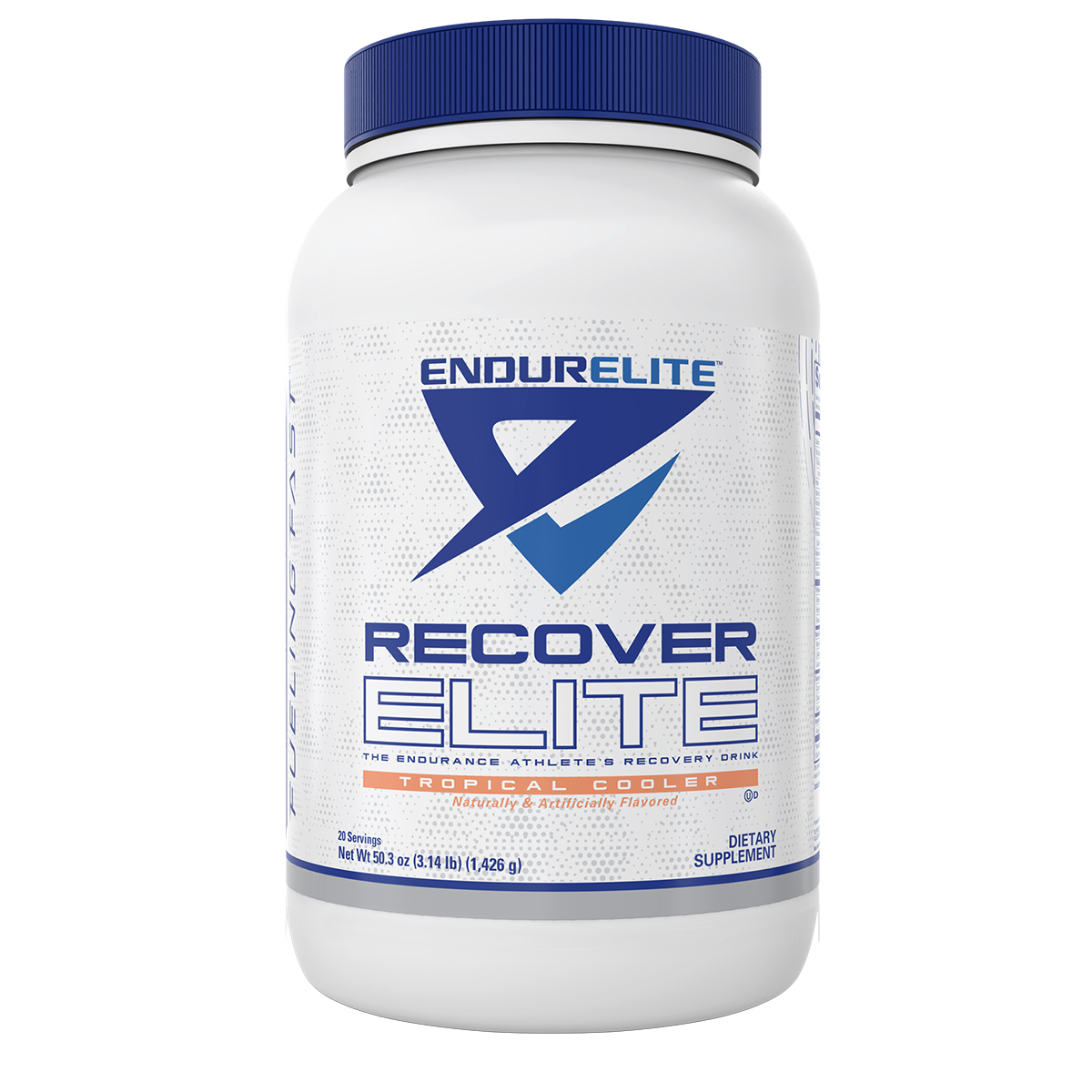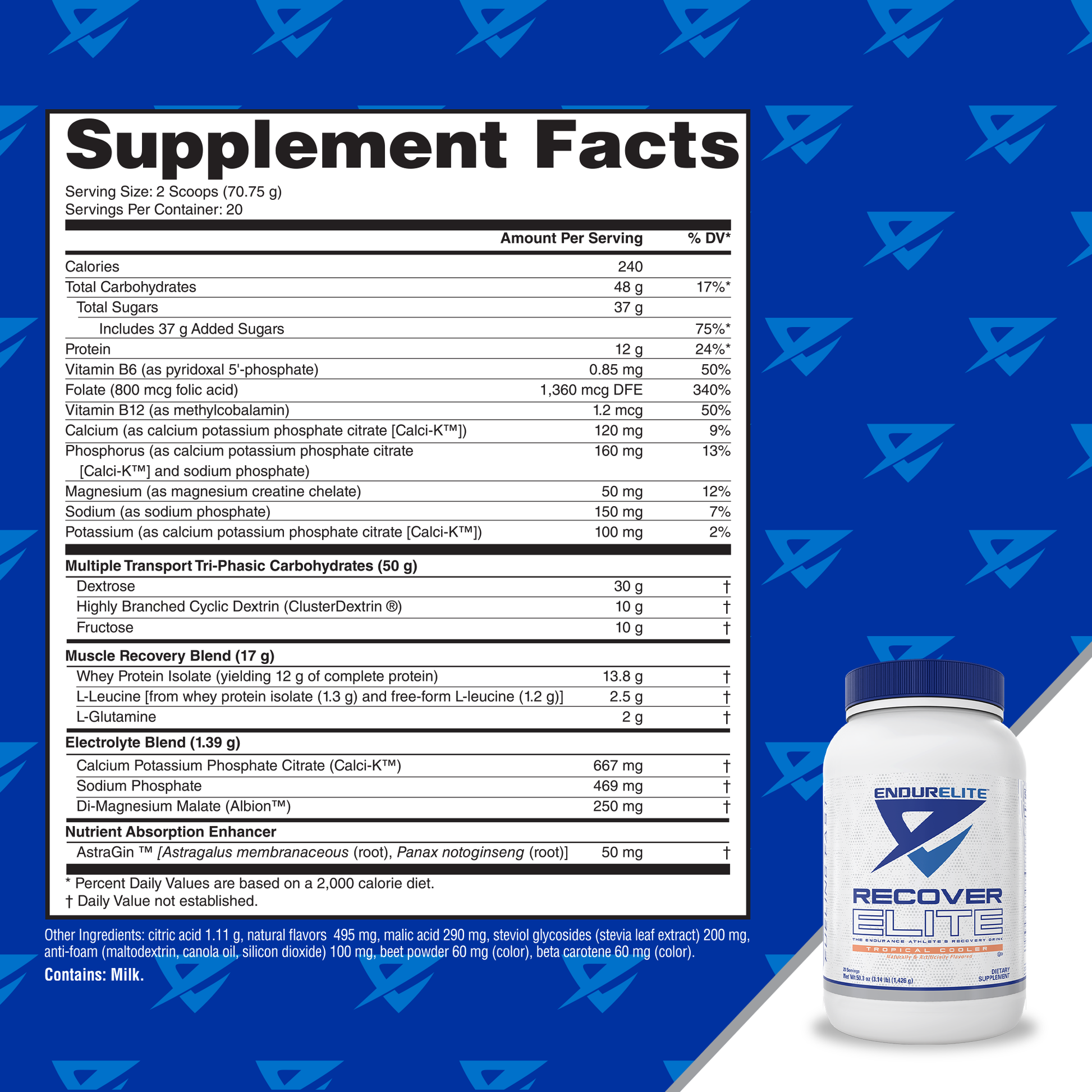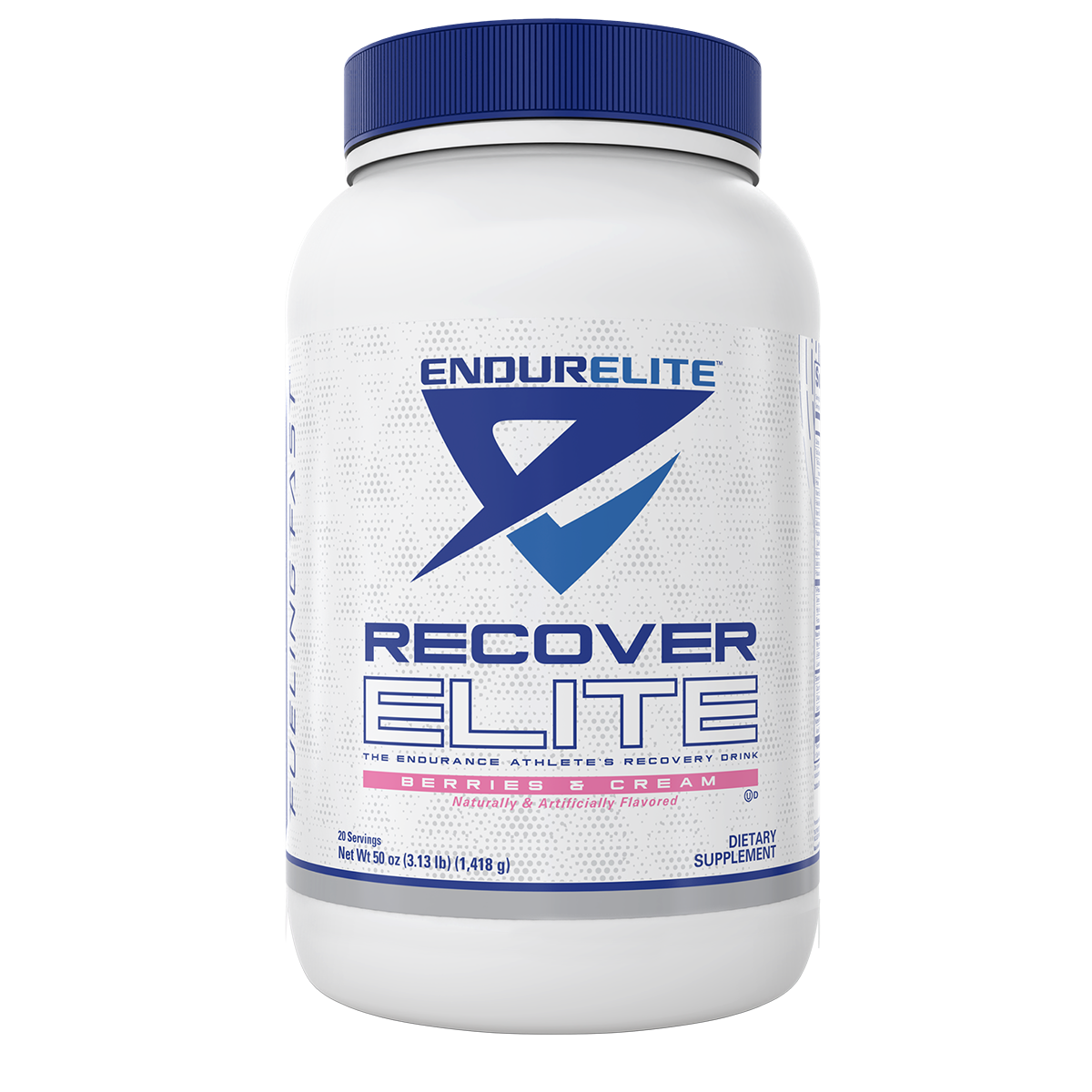Description
Description
The Endurance Athlete's Recovery Drink
- Delicious, All-in-One Recovery Drink for Endurance Athletes*
- Proven Post-Training 4:1 Carb-to-Protein Ratio*
- Tri-phasic Carbohydrate Blend to Quickly Replenish Glycogen*
- Protein & Leucine to Accelerate Muscle Repair & Recovery*
- Helps Minimize Exercise-Induced Muscle Damage*
- Electrolytes & Amino Acids
- 20 Servings Per Container
- Read More about Recover Elite Here
Description
Recover Elite Is A Delicious, All-In-One Recovery Drink For Endurance Athletes
Get ready to come back stronger and faster. RECOVER ELITE is scientifically engineered to refuel and repair exhausted muscle so that you can quickly recover from your most intense training sessions and do it all over again. RECOVER ELITE is SWEETENED WITH STEVIA, so it contains no aspartame, sucralose, saccharin, xylitol, or acesulfame-K.
Hard training is essential to increasing performance, breaking records, and experiencing the kind of results you expect from a life dedicated to proper diet and exercise. And, as important as hard training is, you can really only train as effectively as you recover. In other words, while the focus tends to be on training, it’s key to place equal emphasis on recovery. Your ability to set PRs, go stronger, last longer, etc. is directly tied to how effectively your muscles and nervous system have recovered from the previous training session.
Years of intensive scientific research have shown us that post-workout supplementation can play a pivotal role in supporting the body’s ability to recover quickly by replenishing glycogen, halting protein breakdown, enhancing protein synthesis, and more. Essentially, the more effectively you recover, the more frequently you’ll be able to train hard, thereby improving at a greater rate. This is precisely why RECOVER ELITE was created — to be the most advanced, scientifically-backed, and effective recovery supplement for endurance athletes on the market!
Tri-Phasic Energy Blend
Carbs fuel elite performance. There’s no two ways about it.
Unfortunately, the vast majority of supplements use poor-quality, suboptimal sources of carbohydrates that can leave you feeling heavy and sluggish or, worse, sprinting for the bathroom. We’ve addressed those issues (and more) with our novel tri-phasic energy blend containing:
- Dextrose
- Fructose
- Cluster Dextrin
You may be wondering why RECOVER ELITE includes three forms of carbohydrates. The truth is that the body can absorb only so much glucose (dextrose) at a time. However, research has shown us that combining different carbohydrate sources (such as dextrose and fructose) can increase total exogenous carbohydrate availability, allowing for greater carbohydrate use[1,2], which supports better performance and recovery than consuming only glucose.
Fructose co-ingestion is also noted to accelerate post‐exercise liver glycogen repletion rates, which is desirable when athletes have a quick turnaround between training sessions (<24 hours between intense activities).
GI distress is a common complaint among athletes who take carbohydrate supplements. This is due to using poor-quality carbohydrates that are heavy on the stomach and to consuming too much in a given time frame. Combining fructose with glucose can lower gastrointestinal distress when you ingest relatively large amounts of carbohydrate (>1.2 g/kg/h) during post‐exercise recovery.[1,2]
4:1 Carbohydrate-to-Protein Ratio
Carbohydrates are key to efficient recovery, but research has shown that for truly elite recovery, it’s beneficial to ingest protein alongside carbohydrates. Scientists have researched a number of carb-to-protein ratios over the years, but the most extensively studied is the 4:1 ratio.[3]
RECOVER ELITE supplies 14.4 grams of whey protein isolate 90%, plus 1.2 grams of L-leucine. This maintains the 4:1 carb-to-protein ratio supported by research while also supplying a full 2.5 grams of leucine, thereby fully stimulating the mTOR pathway to kick-start protein synthesis, ignite muscle recovery, and halt muscle breakdown.
When you’re looking to optimize recovery, every second counts. That’s part of the reason we included whey protein isolate. It contains minimal amounts of fat or lactose, thereby increasing the speed of digestion while reducing the risk of GI distress due to a high lactose concentration (which is prevalent in lower-quality, or cheaper, protein sources).
How to Use:
RECOVER ELITE is designed to facilitate rapid glycogen replenishment, halt muscle breakdown, and kick-start the body’s inherent recovery mechanisms. So, we suggest consuming 1 to 1.5 servings of RECOVER ELITE immediately after training.
If you are competing or training multiple times in the same day, you may want to consume 1 to 1.5 serving(s) immediately and then every 1 to 4 hours afterward, between bouts of training.
While RECOVER ELITE is intended to be used as a post-workout recovery supplement, it can also serve as a between-meals snack or on-the-go option when you’re pressed for time and need to get in high-quality nutrition to fuel your mind and body.
When to Use:
Consume 1 to 1.5 servings of RECOVER ELITE immediately after intense training. If you are performing a lighter training session, consume 0.5 to 1 serving (depending on intensity of training and body weight).
Ingredients
Dextrose: Dextrose is almost identical to glucose, which is the sugar found in the bloodstream. Usually, large quantities of sugar are unwanted, but post-exercise is the exception. High glycemic sugars quickly get into muscles to restock muscle glycogen.
Fructose: Fructose complements the other carbohydrates in RECOVER ELITE to take advantage of multiple transporters in the intestine and greatly enhance carbohydrate uptake.
Cyclic Cluster Dextrin (Cluster Dextrin): Cluster Cyclic Dextrin is a moderate-speed carbohydrate in terms of digestion. Having a variety of fast and moderate digestion speeds may increase total carbohydrate uptake over a 1-hour period.
Whey Protein Isolate: Whey is the most potent protein source for enhancing muscle repair processes, and the elaborate extraction process keeps protein intact while removing nearly all carbohydrates and fats. Whey increases muscle protein synthesis, decreases soreness, accelerates recovery, and boosts immunity.
L-Leucine: Leucine is the amino acid in protein that is responsible for initiating protein synthesis. Protein synthesis is required for muscle recovery. RECOVER ELITE contains a total of 2.5 grams of L-leucine per serving, the dose that research has shown will stimulate muscle protein synthesis.
Glutamine: Glutamine is a conditionally essential amino acid that plays a key role in immune function, gut health, cell proliferation and energy production. Under normal circumstances, the body has ample stores of glutamine; however, intense stress can deplete glutamine stores and outpace the body’s ability to meet demand. Glutamine supplementation is an effective method for increasing glutamine availability, and research shows it may support muscle recovery and offer anti-fatigue benefits.[4]
Specifically, glutamine activates an enzyme called glycogen synthase. This stimulates glycogen synthesis in the body, which promotes greater recovery. In fact, glutamine + carbohydrate supplementation has been found to increase whole-body carbohydrate storage to a greater extent compared to carbohydrate supplementation alone.[6] Furthermore, glutamine may also reduce ammonia accumulation.[4,5] FYI, ammonia accumulation is one of the main causes of fatigue.
AstraGin®: AstraGin activates intestinal transporters to increase the absorption of nutrients in RECOVER ELITE . RECOVER ELITE includes a full 50 mg of AstraGin to enhance amino acid and protein uptake, promoting efficient substrate use for greater muscle repair and recovery, which in turn allows you to train harder and more frequently.
Albion Chelated Magnesium: Magnesium is a critical mineral and electrolyte involved in over 300 of the body’s biological processes. From a sports performance and recovery standpoint, magnesium plays a key role in helping muscles to relax and avoid cramping. Magnesium also activates vitamin D to prevent muscle weakness and pain.
To top it off, magnesium is also one of the most common micronutrient deficiencies, especially among hard-training athletes. RECOVER ELITE includes the premium form of magnesium supplements in Albion chelated magnesium, which offers superior bioavailability and uptake compared to other forms of magnesium supplements included in recovery products, such as magnesium oxide.
Electrolytes: The major electrolyte minerals include sodium, chloride, potassium, magnesium, and calcium. Besides preventing cramping, each has its own unique function. Sodium is the primary intracellular electrolyte, while potassium is the primary extracellular mineral. Calcium has numerous roles, but the most relevant to exercise is its responsibility for initiating muscle contractions. Chloride is the most abundant negatively charged ion with several roles in gut function and cell homeostasis. Last but not least, magnesium is a co-factor for hundreds of reactions, most of which are related to nutrient metabolism, muscle and vascular tone, and antioxidant synthesis.
B-Vitamins: RECOVER ELITE contains the biologically active forms of B vitamins most crucial to carbohydrate, fat, and protein metabolism. These include B6, B9, and B12, or pyridoxal 5′ phosphate, folate, and methylcobalamin respectively.
FAQs
What is the best way to take RecoverElite?
Generally speaking, women should take 1 serving and men should take 1.5 servings of RecoverElite for optimized recovery. RecoverElite is formulated so that one serving meets the needs of a 50 kg athlete, as well-trained women are about 50 kg, and trained men are about 75 kg. However, your specific needs may not fit these parameters, so if you want to be specific in your dosing, take 1 serving per 50 kg of body weight. An exception to that rule is if you’re a man over 20% body fat or a woman over 30% body fat, in which case the 1 – 1.5 serving(s) rule still applies.
If you are competing or training multiple times in the same day, you may want to use 1 – 1.5 serving(s) immediately and every 1 – 4 hours thereafter between bouts of exercise. While we still recommend RecoverElite immediately post-exercise due to its rapid digestion, meals could easily serve you just as well in the 1 – 4 hour intervals between bouts of exercise.
What makes RecoverElite the best? Why should I use it?
You should use RecoverElite any time you are going to use the same muscle groups on back-to-back days or sessions. Most recovery products are underdosed, but RecoverElite is not. While some companies only consider their bottom line and worry whether or not athletes will purchase their products, we know that athletes want what’s best, so we put you first! That’s why we have clearly laid out dosing protocols and an optimal 4:1 ratio of an ideal blend of carbohydrates and easily digested whey isolate with additional leucine to maximally stimulate recovery processes. In addition to the basics, we’ve also included 3 other key supplements to enhance absorption, metabolism, and insulin sensitivity, and quite simply, this is something no other product offers.
What is the significance of a 4:1 ratio?
The 4:1 ratio comes from what has been determined to be the optimal amounts of carbohydrate and protein for glycogen resynthesis and muscle damage repair. In isolation, carbohydrates are most effective for glycogen resynthesis at 1.0 – 1.2 grams per kilogram body weight, and protein is most effective for increasing rates of muscle protein synthesis at 0.25 – 0.30 grams per kilogram body weight. This happens to work out perfectly to a 4:1 ratio. Carbohydrates and proteins consumed in combination post-exercise also enhance each other’s efficacy, a synergistic effect.
References
-
Gonzalez JT, Fuchs CJ, Betts JA, van Loon LJ. Glucose Plus Fructose Ingestion for Post-Exercise Recovery-Greater than the Sum of Its Parts? Nutrients. 2017;9(4):344. Published 2017 Mar 30. doi:10.3390/nu9040344
-
Fuchs CJ, Gonzalez JT, van Loon LJC. Fructose co-ingestion to increase carbohydrate availability in athletes. J Physiol. 2019;597(14):3549-3560. doi:10.1113/JP277116
-
Kloby Nielsen LL, Tandrup Lambert MN, Jeppesen PB. The Effect of Ingesting Carbohydrate and Proteins on Athletic Performance: A Systematic Review and Meta-Analysis of Randomized Controlled Trials. Nutrients. 2020;12(5):1483. Published 2020 May 20. doi:10.3390/nu12051483
-
Coqueiro AY, Rogero MM, Tirapegui J. Glutamine as an Anti-Fatigue Amino Acid in Sports Nutrition. Nutrients. 2019;11(4):863. Published 2019 Apr 17. doi:10.3390/nu11040863
-
Varnier M, Leese GP, Thompson J, Rennie MJ. Stimulatory effect of glutamine on glycogen accumulation in human skeletal muscle. Am J Physiol. 1995 Aug;269(2 Pt 1):E309-15. doi: 10.1152/ajpendo.1995.269.2.E309. PMID: 7653548.
-
Bowtell JL, Gelly K, Jackman ML, Patel A, Simeoni M, Rennie MJ. Effect of oral glutamine on whole body carbohydrate storage during recovery from exhaustive exercise. J Appl Physiol (1985). 1999 Jun;86(6):1770-7. doi: 10.1152/jappl.1999.86.6.1770. PMID: 10368336.
-
Burke LM. Energy needs of athletes. Canadian journal of applied physiology = Revue canadienne de physiologie appliquee.2001;26 Suppl:S202-219.
-
Burke LM, Kiens B, Ivy JL. Carbohydrates and fat for training and recovery. Journal of sports sciences.Jan 2004;22(1):15-30.
-
Jeukendrup AE. Nutrition for endurance sports: marathon, triathlon, and road cycling. Journal of sports sciences.2011;29(sup1):S91-S99.
-
Jeukendrup AE. Periodized nutrition for athletes. Sports medicine.2017;47(1):51-63.
-
Norton LE, Layman DK. Leucine regulates translation initiation of protein synthesis in skeletal muscle after exercise. The Journal of nutrition.Feb 2006;136(2):533S-537S.
-
Norton LE, Wilson GJ, Layman DK, Moulton CJ, Garlick PJ. Leucine content of dietary proteins is a determinant of postprandial skeletal muscle protein synthesis in adult rats. Nutrition & metabolism.2012;9(1):67.
-
Phillips SM. Physiologic and molecular bases of muscle hypertrophy and atrophy: impact of resistance exercise on human skeletal muscle (protein and exercise dose effects). Applied physiology, nutrition, and metabolism = Physiologie appliquee, nutrition et metabolisme.Jun 2009;34(3):403-410.
-
Phillips SM. Dietary protein requirements and adaptive advantages in athletes. British Journal of Nutrition.2012;108(S2):S158-S167.
-
Phillips SM. A brief review of critical processes in exercise-induced muscular hypertrophy. Sports medicine.May 2014;44 Suppl 1:S71-77.
-
Phillips SM, Van Loon LJ. Dietary protein for athletes: from requirements to optimum adaptation. Journal of sports sciences.2011;29 Suppl 1:S29-38.
-
Thomas DT, Erdman KA, Burke LM. American College of Sports Medicine Joint Position Statement. Nutrition and Athletic Performance. Medicine and science in sports and exercise.Mar 2016;48(3):543-568.
-
Wilson GJ, Layman DK, Moulton CJ, et al. Leucine or carbohydrate supplementation reduces AMPK and eEF2 phosphorylation and extends postprandial muscle protein synthesis in rats. American journal of physiology. Endocrinology and metabolism.Dec 2011;301(6):E1236-1242.
-
Taylor HL, Wu CL, Chen YC, Wang PG, Gonzalez JT, Betts JA. Post-Exercise Carbohydrate-Energy Replacement Attenuates Insulin Sensitivity and Glucose Tolerance the Following Morning in Healthy Adults. Nutrients.Jan 25 2018;10(2).
-
Fielding, R., Riede, L., Lugo, J. P., & Bellamine, A. (2018). l-Carnitine Supplementation in Recovery after Exercise. Nutrients, 10(3), 349.
-
Volek, J. S., Kraemer, W. J., Rubin, M. R., Gómez, A. L., Ratamess, N. A., & Gaynor, P. (2002). L-Carnitine L-tartrate supplementation favorably affects markers of recovery from exercise stress. American Journal of Physiology-Endocrinology and Metabolism, 282(2), E474-E482.
-
Ho, J. Y., Kraemer, W. J., Volek, J. S., Fragala, M. S., Thomas, G. A., Dunn-Lewis, C., ... & Maresh, C. M. (2010). l-Carnitine l-tartrate supplementation favorably affects biochemical markers of recovery from physical exertion in middle-aged men and women. Metabolism-Clinical and Experimental, 59(8), 1190-1199.
-
Spiering, B. A., Kraemer, W. J., Hatfield, D. L., Vingren, J. L., Fragala, M. S., Ho, J. Y., ... & Volek, J. S. (2008). Effects of L-carnitine L-tartrate supplementation on muscle oxygenation responses to resistance exercise. The Journal of Strength & Conditioning Research, 22(4), 1130-1135.
-
Bloomer, R. J., Farney, T. M., Trepanowski, J. F., McCarthy, C. G., Canale, R. E., & Schilling, B. K. (2010). Comparison of pre-workout nitric oxide stimulating dietary supplements on skeletal muscle oxygen saturation, blood nitrate/nitrite, lipid peroxidation, and upper body exercise performance in resistance trained men. Journal of the international society of sports nutrition, 7(1), 16.
-
Bloomer, R. J., & Smith, W. A. (2009). Oxidative stress in response to aerobic and anaerobic power testing: influence of exercise training and carnitine supplementation. Research in Sports Medicine, 17(1), 1-16.
-
Bloomer, R. J., Tschume, L. C., & Smith, W. A. (2009). Glycine propionyl-L-carnitine modulates lipid peroxidation and nitric oxide in human subjects. International journal for vitamin and nutrition research, 79(3), 131-141.
-
Kraemer, W. J., Volek, J. S., French, D. N., Rubin, M. R., Sharman, M. J., Gomez, A. L., ... & Hakkinen, K. (2003). The effects of L-carnitine L-tartrate supplementation on hormonal responses to resistance exercise and recovery. The Journal of Strength & Conditioning Research, 17(3), 455-462.
Reviews
Reviews
Check out our reviews from our customers.



